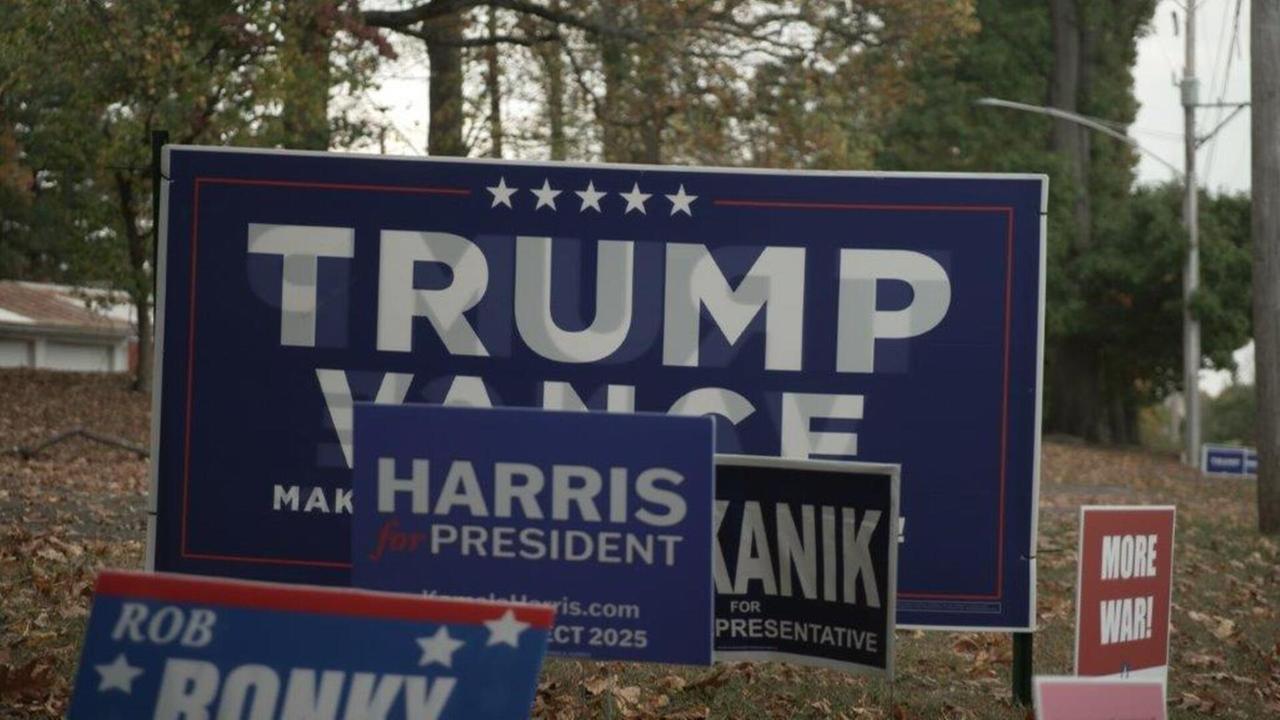The head-to-head race between US presidential candidates Harris and Trump will be decided in the swing states. Shortly before the election, everything is still open here because some voters have not yet made up their minds.
It's “Family Fall Fest”, an autumn festival in West Bradford, a small town in the suburbs of Philadelphia. The band from the local music school School of Rock keeps the atmosphere going – there are hot dogs, pumpkins to paint and short tours in the tractor-drawn hay wagon. Politics doesn't play a role for a moment – and Grace and Libby are happy about it.
As first-time voters, they are courted particularly intensively by the candidates: “The text messages I receive are uncountable,” says Grace. She pulls out her cell phone and reads: “Grace, who do you want to vote for? Grace, do you have a plan for the election? Grace, if you don't want to wait in line, register here! – There are always more!”
The two 20-year-olds made their decision long ago. They will vote for the Democratic candidate, Kamala Harris, because she stands up for the rights of women and the LGBTQ+ community, to which they belong.
But most of her family see it completely differently, says Libby: “My parents, even my brother, unfortunately, many aunts and uncles – they will all vote for Donald Trump,” says the student with the nose piercing. “It's disappointing, but you have that right.”
Divided country, divided families
The School of Rock has arrived at Rob's favorite song: “You can do magic” by the 80s folk band “America”. The 18-year-old, his chin-length brown hair like a curtain over his face, plucks the bass. His father, Chris, stands far to the right of the stage, his mother, Leah, to the left. The political divide in Pennsylvania also divides her family. Leah, Rob and his sisters want to vote for Harris. Not the father.
“We've been together for 25 years,” says Leah Fox. “And we just don't talk about politics. Because we want to stay married.” The woman in her fifties is registered as a Republican in the electoral roll. But she couldn't vote for Trump: “I knew pretty much from the start that he was a problem,” says Leah Fox about the Republican candidate.
She worked in a tech company for a long time. That's why she knows men like Trump: “They may have short-term success. But they destroy everything around them. I can't support that.”
As in the last two US elections, the race in the US state of Pennsylvania is once again extremely close this November.
Republicans campaigning for Harris
Trump won the 2016 election in Pennsylvania by just 1.2 percentage points; In 2020, Democratic US President Joe Biden won just as narrowly.
It was particularly tight for the Democrats both times in Bucks County, north of Philadelphia, where there are primarily Trump signs on the roadside farms – and primarily pro-Harris signs in the front yards of the county seat of Doylestown. This time too it will probably be a head-to-head race. Swing voter Leah Fox doesn't want to leave anything to chance.
So the day after the fall festival, she stands with Greg Page in a sprawling middle-class neighborhood with very large gardens and very tall trees. The two Republicans are campaigning for Harris here. Fox is there for the first time. Page, who lives almost three hours' drive away in the US state of Virginia and worked as a young lawyer in the Reagan administration, is now spending his eighth weekend here.
For the 67-year-old, Trump is not a real Republican: “For me, they were people like Reagan, Lincoln or Theodore Roosevelt.” The most important issues for him are respect for democracy and support for Ukraine: “And if that's important to you, you can only vote for Harris,” says Page and marches to the first front door. At first nothing happens except dogs barking, then a somewhat annoyed man in his mid-fifties comes out and shouts: “What do you want? Can I help you?” The doorstep campaigners disturbed him while he was watching the football game, so he sends them away.
“It's your voice that counts!”
A few hundred meters further, the two “Republicans for Harris” have better luck: Scott comes out with his two small children. The 40-year-old teacher is not only a so-called “independent”, i.e. non-partisan. He's also among the three percent of Pennsylvania voters who pollsters say still haven't made up their minds. “It's your voice that counts!” Fox explains to him at the door.
And Page informs him how many of Trump's government members have now turned their backs on the ex-president, including former military personnel. “And Trump is now threatening them with a trial in a military court,” says Page. “Can you believe this?” “I don’t know what to believe,” Scott says. He still doesn't want to decide whether and who he will vote for.
Page doesn't let that discourage him. The lawyer will continue to knock on doors here every weekend until the election. In polls, Harris is currently still slightly ahead of Trump, but her lead has shrunk recently. Greg Page finds his commitment all the more important: “If you only reach 1,000 to 2,000 people, then you can still influence the election. That's exciting!”
You can see more about this topic today in the tagesthemen – at 10:15 p.m. on the first.
Ahead of the US elections, our correspondents traveled to four particularly hotly contested states – Arizona, Pennsylvania, North Carolina and Georgia. From there they describe how the various groups of voters are being fought for. A first report deals with the Latino voters in Arizona.
Julia Kastein, ARD Washington, tagesschau, October 15, 2024 10:49 a.m





